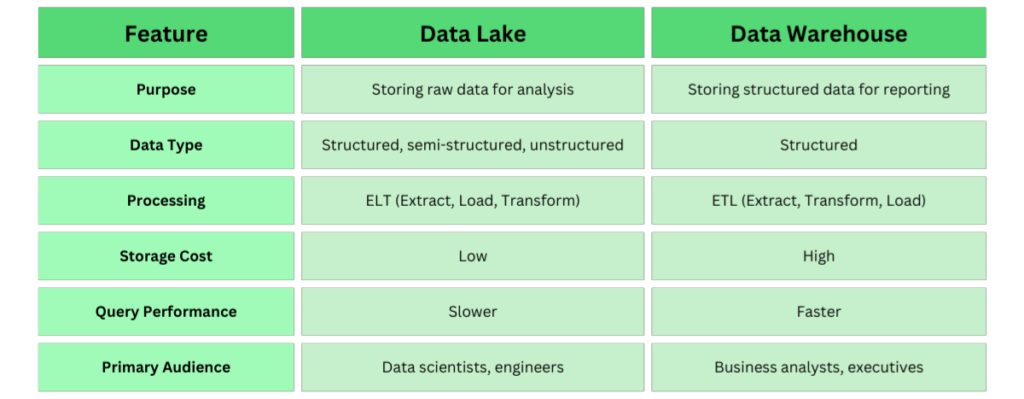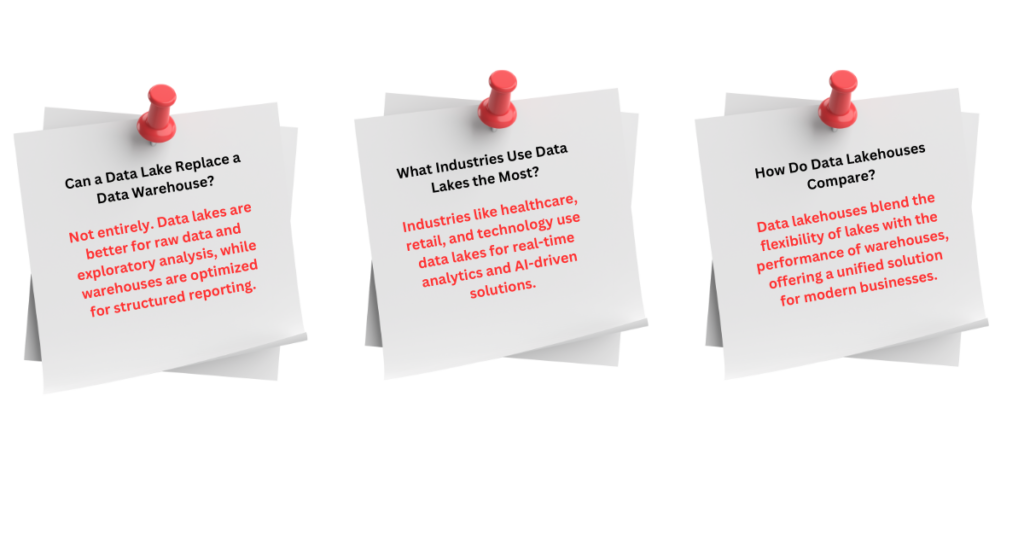In a world where data is the driving force behind business decisions, the ability to store, manage, and analyze data effectively is crucial. However, with the variety of options available, organizations often find themselves grappling with a common problem: Should they use a Data Lake or a Data Warehouse?
Both systems have unique strengths, use cases, and advantages. But selecting the right solution depends on your specific business requirements. This blog dives deep into the differences between data lakes and data warehouses, helping you make an informed decision.
What is a Data Lake?
Imagine a vast reservoir where all types of water—rain, river, and ocean—flow in unfiltered. A data lake works similarly for data. It is a centralized repository that stores raw data in its native format, accommodating structured, semi-structured, and unstructured data.
Key Characteristics of a Data Lake
- Scalability: Designed to handle petabytes of data effortlessly.
- Flexibility: Supports diverse data types such as videos, images, and logs.
- Cost-Effective: Relies on inexpensive storage solutions.
- Schema-on-Read: Data is only structured when accessed for analysis, providing unmatched flexibility.
How Businesses Use Data Lakes?
Businesses leverage data lakes to unlock powerful insights by working directly with raw, unstructured datasets. They are ideal for machine learning and AI projects, where raw data is fed into advanced algorithms for predictive analytics and trend forecasting. Data lakes also excel in real-time data analysis, seamlessly handling streaming data from IoT devices and social media platforms to provide instant insights. Additionally, they empower exploratory data analysis, allowing data scientists to experiment with diverse datasets and uncover hidden patterns without the constraints of pre-structured formats.

What is a Data Warehouse?
A data warehouse, on the other hand, is more like a well-organized library. It stores processed and structured data, making it readily accessible for reporting and analysis.
Key Characteristics of a Data Warehouse
- Optimized for Analytics: Built for complex queries and fast reporting.
- Structured Storage: Uses predefined schemas to organize data.
- High Performance: Executes queries quickly, even with large datasets.
- Schema-on-Write: Data is cleaned and structured before storage, ensuring reliability.
How Businesses Use Data Warehouses?
Businesses rely on data warehouses to transform organized data into actionable insights. They are a cornerstone of business intelligence, driving dashboards, reports, and performance analytics that help teams make informed decisions. Data warehouses also excel in historical data analysis, enabling businesses to identify trends and forecast future outcomes. Additionally, they provide a secure and structured environment for managing compliance and audit trails, ensuring that critical data remains accessible and reliable during reviews or regulatory checks.

Data Lakes vs. Data Warehouses

When Should You Choose a Data Lake?
A data lake is the ideal solution when your business handles a wide variety of raw data, such as information from IoT devices, social media platforms, or other unstructured sources. Its flexibility allows you to store massive amounts of data, making it perfect for businesses that need scalability as they grow. Additionally, if you have a data science team, data lakes provide the perfect environment for experiments, building AI models, and performing advanced analytics directly on raw data, unlocking valuable insights without rigid structuring upfront.
When Should You Choose a Data Warehouse?
A data warehouse is the best choice when your business prioritizes quick insights and real-time reporting for effective decision-making. It is designed for clean, structured data, providing a well-organized environment that allows stakeholders to easily access and analyze information. This makes it ideal for creating dashboards, tracking KPIs, and generating business intelligence that supports strategic planning and operational improvements. If your focus is on structured analysis and making data-driven decisions, a data warehouse is the way to go.
Can We Use Both?
A data lakehouse is a hybrid solution that merges the flexibility of data lakes with the structure and performance of data warehouses. It offers several advantages:
- Unified Storage: Enables storing both raw and processed data in one centralized system, simplifying data management.
- Streamlined Analytics: Provides faster query performance compared to traditional data lakes, making it ideal for real-time insights.
- Cost Efficiency: Reduces redundancy by minimizing the need for data duplication, lowering storage and operational costs.
This innovative approach makes data lakehouses a powerful option for modern businesses seeking versatility and efficiency.

Factors to Consider When Choosing Between Data Lakes and Data Warehouses
Selecting the right data management solution depends on your business’s unique needs. Here are key factors to evaluate:
- Budget: Data lakes are often more cost-efficient for storage as they can handle raw, unprocessed data without expensive preprocessing steps. However, they may require additional investments in processing tools and skilled professionals to extract insights. Data warehouses, while more structured, often come with higher upfront and maintenance costs due to their optimized query capabilities and pre-designed architecture.
- Data Variety: If your business deals primarily with unstructured or semi-structured data, such as images, videos, or social media feeds, a data lake is better suited. In contrast, if your data is already clean and structured—like sales records or customer databases—a data warehouse provides a more efficient and organized environment for analysis.
- Expertise: Data lakes require a skilled team of data engineers and analysts who can work with raw data and employ advanced tools to extract insights. Data warehouses, with their user-friendly interfaces and structured formats, are more accessible for business teams without deep technical expertise, enabling broader usage across departments.
- Analytics Needs: For businesses that prioritize AI, machine learning, and exploratory data analysis, data lakes are indispensable, as they provide the flexibility to work with raw datasets. However, if your focus is on generating dashboards, tracking KPIs, and performing quick, structured analysis for decision-making, a data warehouse is the better option.
Understanding these factors can guide you toward the solution that best aligns with your goals, resources, and technical capabilities.
Conclusion
Choosing between a data lake and a data warehouse depends on your organization’s unique needs, goals, and resources. Data lakes offer flexibility and scalability for handling diverse, raw data, making them ideal for advanced analytics and machine learning. On the other hand, data warehouses provide a structured, user-friendly environment perfect for generating actionable business intelligence and supporting decision-making.
For businesses seeking the benefits of both, a data lakehouse serves as an innovative hybrid solution, offering unified storage, faster analytics, and cost efficiency. By carefully evaluating factors like budget, data variety, expertise, and analytics needs, you can select the right approach to unlock the full potential of your data and drive smarter business outcomes.
Links to refer more: https://www.databricks.com/discover/data-lakes




